
MPs are to debate and vote on prime minister Theresa May’s Brexit deal. But what will happen in the coming days?
• What is the current plan?
The government has allotted time on five days for the deal to be debated. This includes up to eight hours of debate on December 4, 5, 6 and 10 – with the votes expected on December 11. Amendments have been tabled by two Labour MPs to extend the time for debate.
• What are they debating?
The Withdrawal Agreement negotiated by the government, which outlines the terms on which the UK will leave the EU and the desired future relationship. MPs are being asked to approve this by supporting a motion tabled by the prime minister.
• Can MPs change what has been put forward?
Yes. Speaker John Bercow can select up to six amendments which MPs can then vote on.
• What are the amendments?
Various options have been tabled. Labour’s official proposal would decline to approve May’s Brexit deal and explains this is because it fails to provide for a permanent UK-EU customs union and ‘strong’ single market deal. It also voices concerns over Northern Ireland.
Labour’s amendment also outlines that MPs will ‘pursue every option’ that prevents the UK leaving the EU on the terms of Mrs May’s deal or leaving without a deal.
Tory and Labour backbenchers have also tabled an amendment which seeks to reject May’s deal while also avoiding a no-deal Brexit.
• What will happen with the votes?
This is the unknown. Some 20 Conservative MPs have said publicly they will vote against May’s deal, 45 have said they will not vote in favour and more than 20 have said they are unhappy with it.
With May’s minority government allies the DUP also expressing their own concerns, then the chance of the deal being approved with a simple majority of 320 of the 639 MPs eligible to vote is highly unlikely.
Any amendment would need to appeal to a wide enough group of MPs to receive the required votes to be successful. Abstentions are likely on all votes.
• What does a vote involve?
MPs walk through division lobbies – in essence, rooms either side of the Commons chamber known as the ayes and noes. They have eight minutes to reach the division lobbies when a vote is called.
They register their vote on a tablet device and the result is usually announced within 15 minutes of the vote being called.
If there is more than one vote, MPs tend to wait in the chamber and the process is repeated.
• What about the House of Lords?
They will spend three days debating the deal on December 5, 6 and 10.
Warning: Illegal string offset 'link_id' in /mnt/storage/stage/www/wp-includes/bookmark.php on line 357
Notice: Trying to get property 'link_id' of non-object in /mnt/storage/stage/www/wp-includes/bookmark.php on line 37






